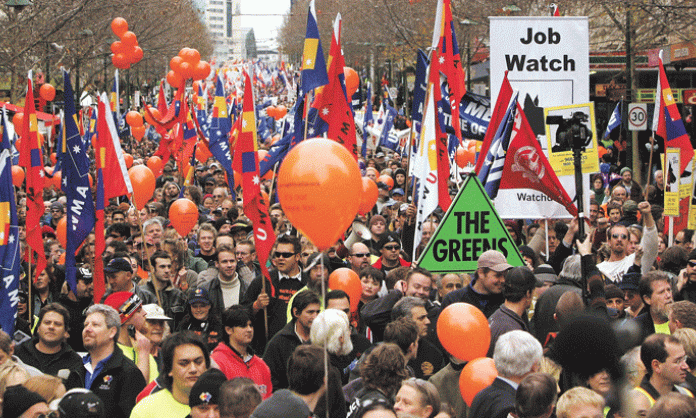As the Liberals prepare for government, some major employers are preparing for war. Australia needs “a dose of Margaret Thatcher” according to Mark Adamson, the boss of Fletcher Building Ltd, one of the largest construction companies in Australia.
His sentiments are echoed throughout sections of corporate Australia.
It’s not all huffing and puffing, either. A major dispute is brewing in the offshore oil and gas sector. Chevron, a global giant with over $26 billion in annual profit, is gearing up for a fight with the Maritime Union of Australia’s West Australian branch – one of the few unions in the country to win significant gains for its members out of the mining boom.
Other companies have launched vicious attacks against their workforces and their unions. After a massive propaganda barrage, Brisbane abattoir Teys Brothers is trying to force through a non-union collective agreement that eradicates key conditions.
Also in Queensland, global mining giant Glencore-Xstrata has shut down its mine in Collinsville, where coal has been mined for a hundred years. Reopening it, says the company, will depend on workers abandoning long-established conditions won by generations of militant Collinsville miners. In the meantime, the company is shutting the mine, leaving workers to rot. According to ABC Radio reports, the company is hiring large numbers of security guards and potential scabs, in anticipation of a major dispute.
The Liberals have been careful to keep industrial relations policy low profile in this election campaign. They have learned some lessons from their defeat in 2007, following their across-the-board WorkChoices offensive on working conditions. WorkChoices inspired a number of massive set piece strikes and a significant electoral backlash.
This time the Liberals are picking their targets more carefully. They don’t have to repeat the broad assault, as much of WorkChoices remains in place through Labor’s “Fair Work” regime. The Liberals also calculate that a combination of complex but very significant changes to the law can assist employers in smashing union power.
The Australian Financial Review recently explained: “The Coalition’s policy largely leaves workers’ entitlements alone but the same cannot be said for unions. They will be squarely in the Coalition’s sights.” Of course, if unions are dramatically weakened, employers will find it straightforward to trash conditions.
The strategy of the union movement for a generation has been to avoid all-out confrontation, under Liberal or Labor. That’s been a dismal failure, as the past 30 years of retreat and defeat show. Keeping quiet under Labor has only paved the way for more significant attacks.
The Liberals and big business seem to want to take us on one union at a time – just like Thatcher. Our best strategy is the exact opposite – to stick together and fight like hell.
What’s the difference between Liberal and Labor on workplace rights?
Our short, easy to understand guide to the different aspects of workplace policy of the major parties.
Allowable matters
Under Howard’s WorkChoices laws, it was illegal for unions to bargain over issues including contracting out, casualisation or labour hire. Eliminating these rules on “allowable matters” was one of the few genuine reforms under Labor. Under Liberal policy, the Fair Work Commission will have to be satisfied that all union claims are “fair and reasonable” and that they “won’t adversely affect productivity”. Almost anything that gets in the way of making a profit can be ruled out under this description.
Industrial action
Already, under Labor, it is illegal for workers simply to meet together and decide to go on strike. Even when an enterprise agreement has expired, there has to be a series of negotiations, a secret ballot and three days’ notice so the boss can minimise the impact of the strike.
The Coalition will keep all this, and also has a policy that “protected industrial action can only happen after there have been genuine and meaningful talks between workers and business”. The Coalition criticises the result of the legal case involving JJ Richards, a transport company that simply refused to negotiate with the Transport Workers Union. When the union applied to take industrial action, the company argued that this should not be allowed – because there had been no negotiations! The company lost this case, but it seems that this approach will be legal under the Liberals.
‘Greenfields’ sites
A huge amount of damage was done under the “greenfields” clauses of WorkChoices. Companies could shut down a factory or warehouse, restart the business at a new location and dictate terms. Decent wages and conditions disappeared. Many unions signed terrible, concessionary “greenfields” deals just to get in the door, with the aim of improving the standard afterward. There are still difficulties under Fair Work, but unions can negotiate and, if there is no outcome, unions can start pursuing bargaining as soon as the “greenfields” site opens.
Under the Liberals, unless the unions agree to the bosses’ terms, they would be forced into arbitration, which overwhelmingly favours employers. Bosses would have to negotiate only with the “main” union, which makes it even easier for bosses to make sweetheart deals with grubby right wing unions like the AWU.
Right of entry
Under WorkChoices, union organisers had to give 24 hours’ notice before they could access a work site to investigate a breach of employment standards. They had to specify what breach had occurred, which made it hard to maintain the confidentiality of the worker. And the boss could dictate where organisers were allowed to go in a workplace, and how they were allowed to get there – down to which route they could walk!
All of these restrictions were maintained under Labor’s “Fair Work” laws. Not all unions abide by these provisions, and not all bosses enforce them. But they can be a serious obstacle to unions trying to establish a presence in a workplace. It’s common for management to restrict union meetings to an area just outside the boss’s office. (Labor has just made it legal to use lunch rooms for union meetings.)
The Liberals want to keep all the restrictions, tighten administrative requirements and end right of entry at workplaces where unions are not already party to an enterprise bargain – that is, where unions are relatively weak.
Anti-union bodies
The Liberals will establish a Registered Organisations Commission to police the internal affairs of unions.
The Liberals will re-establish the Australian Building and Construction Commission. The introduction of the ABCC in 2005 caused a sharp spike in workplace deaths and injuries, as it sued unions that stopped work in protest at poor safety. Labor has made things easy for the Liberals by keeping the ABCC going, with reduced penalties, as part of the Fair Work Commission. The new ABCC will police “onshore and offshore” construction, targeting the Maritime Union as well as traditional construction unions.
The Liberals have also indicated support for attacks on weekend penalty rates, extending “individual flexibility agreements”, scrapping the “safe rates” road transport tribunal; and turning exploitative 457 visas into a “mainstay” of immigration policy.









